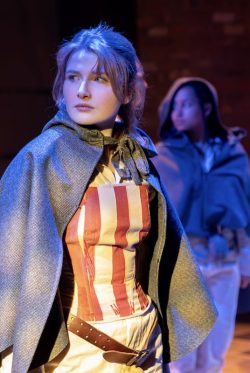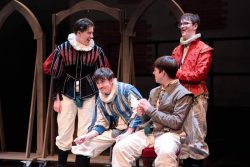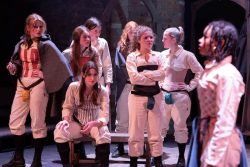 LOOKING back at the list of plays that this company has tackled during its often turbulent, never dull existence – everything from distinctly personalised views of Shakespeare to completely unscripted plays evolved from workshops – you will not find, until now, a Jacobean comedy or tragedy.
LOOKING back at the list of plays that this company has tackled during its often turbulent, never dull existence – everything from distinctly personalised views of Shakespeare to completely unscripted plays evolved from workshops – you will not find, until now, a Jacobean comedy or tragedy.
What then would they do when presented with an early 17th century script from two theatrical giants of the period, Thomas Dekker and Thomas Middleton?
Adapter/director Hope Thain has very definite ideas on the secrets and suggestions she feels are hidden within the original text, and how she and her young company can unlock these in a manner relevant to a modern audience. But to do so the actors must work within a tighter framework than they have come up against previously. Coping with the Jacobean style of delivery is, in itself, a difficult new challenge for even the most experienced of players. For all that, in some of the fast moving multi populated scenes, the action and dialogue were not always crystal clear, this was not a problem that threw this confident group off balance.
 They had their eyes firmly fixed on showing that Moll and her Roaring Girls’ best hope of finding freedom, in an almost completely male dominated world, is to ignore the constrictions of gender and meet their opponents on level terms. With that in mind, a rather stronger definition of male and female costumes would not have gone amiss.
They had their eyes firmly fixed on showing that Moll and her Roaring Girls’ best hope of finding freedom, in an almost completely male dominated world, is to ignore the constrictions of gender and meet their opponents on level terms. With that in mind, a rather stronger definition of male and female costumes would not have gone amiss.
As far as the characters were concerned the battle lines were clearly marked, Moll (Elowen Faulkner), Mary Fitzallard (Jasmine Gwatkin), the girl Moll befriends when she is refused marriage to Seb Stevens, double-dealing Sebastian (Betsy May Wright), Moni McLaren and Eleanor Jones as Moll’s principal Roaring Girls, were more than a match mentally and physically for their male counterparts.
 Because Sebastian’s blinkered traditionalist father Sir Alexander Wengrave and his evil spy Trapdoor, were robbed of much of their ammunition to create humour, as personal identities are explored, Kai Sudbury and Gabe Norris successfully turned Sir Alexander and Trapdoor into figures of fun and purveyors of deceit.
Because Sebastian’s blinkered traditionalist father Sir Alexander Wengrave and his evil spy Trapdoor, were robbed of much of their ammunition to create humour, as personal identities are explored, Kai Sudbury and Gabe Norris successfully turned Sir Alexander and Trapdoor into figures of fun and purveyors of deceit.
 Thanks to Alice Sales cleverly designed mobile open door archways, that served not only to swiftly move members of the cast as it changed, with the aid of minimal dressing, the format of scenes moved at a dazzling pace. To make this work required unselfish and well-rehearsed team work, something that this company has in great quantities.
Thanks to Alice Sales cleverly designed mobile open door archways, that served not only to swiftly move members of the cast as it changed, with the aid of minimal dressing, the format of scenes moved at a dazzling pace. To make this work required unselfish and well-rehearsed team work, something that this company has in great quantities.
Anyone who knows Dekker and Middleton’s play intimately,will find that all the original story is still intact, and realise that Hope Thain and her company of vibrant young players have discovered that you can put forward arguments that, had they been alive today, the authors might well have brought out, the questions of sexual and gender roles and identities that this production places before its audience.
GRP
Photos by James E Davies